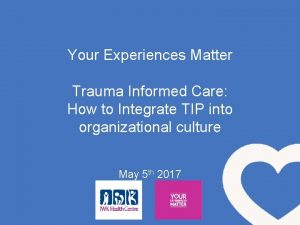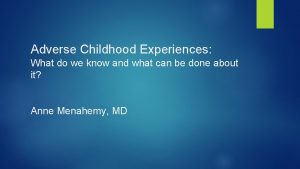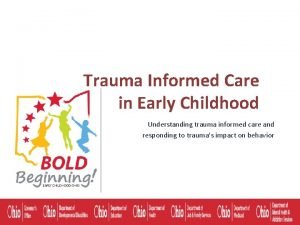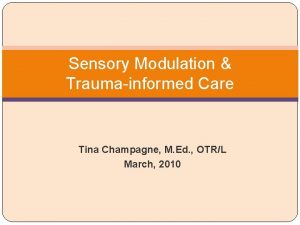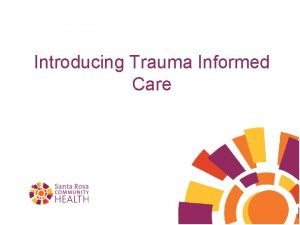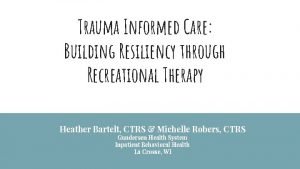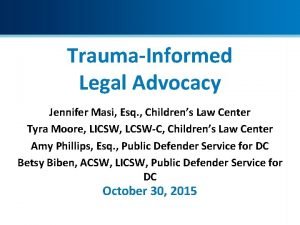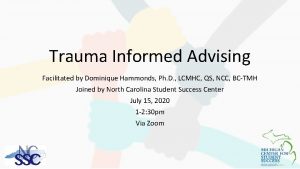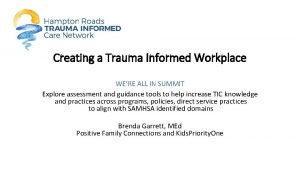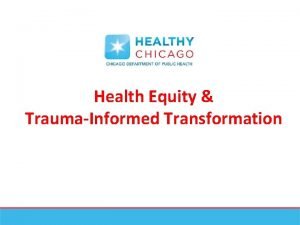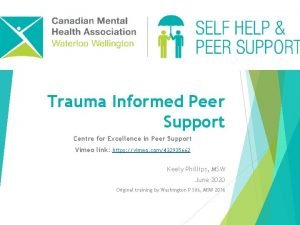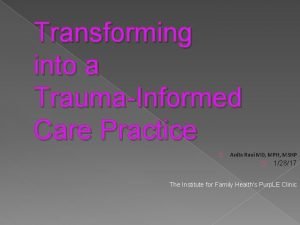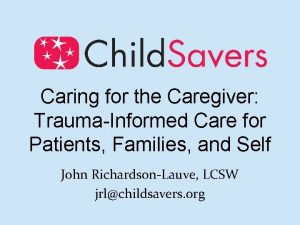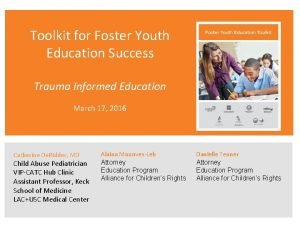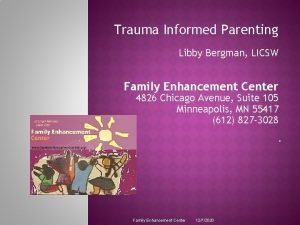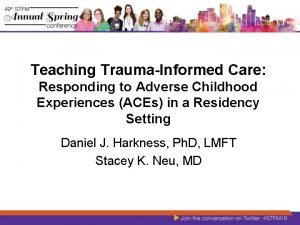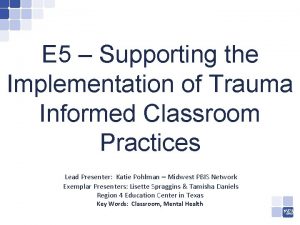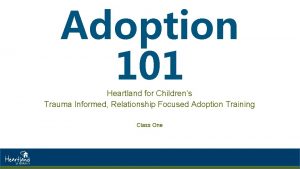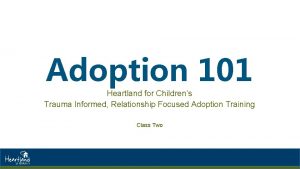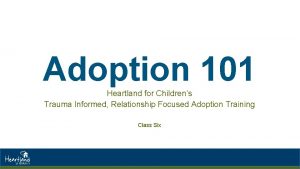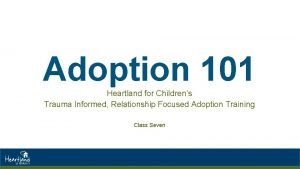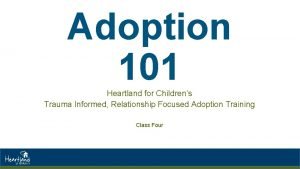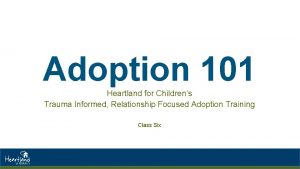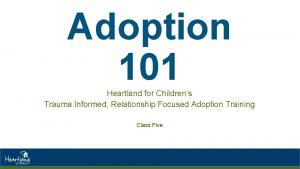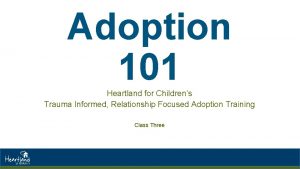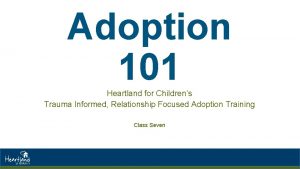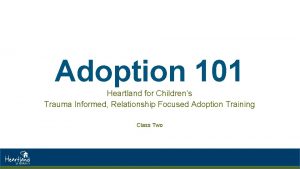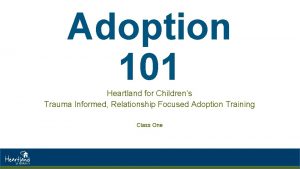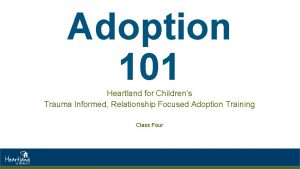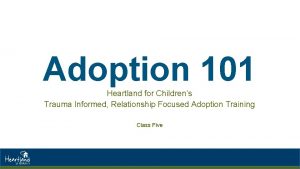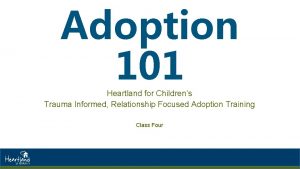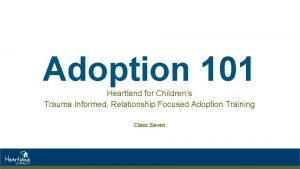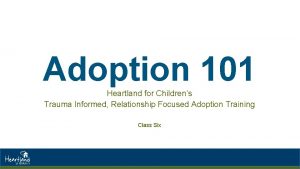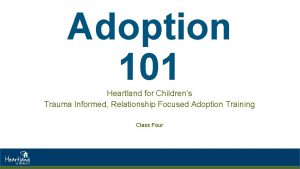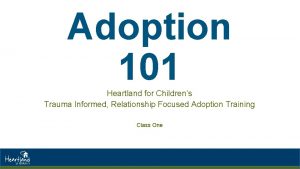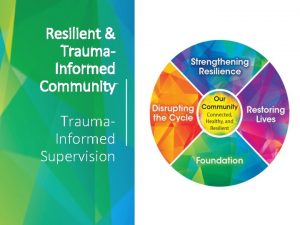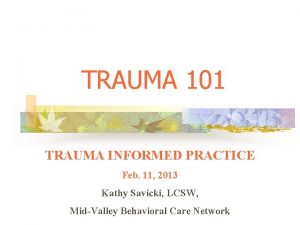Adoption 101 Heartland for Childrens Trauma Informed Relationship























- Slides: 23

Adoption 101 Heartland for Children’s Trauma Informed, Relationship Focused Adoption Training Class Three

Welcome Back! • Agenda for class three: • How Trauma Effects the Brain • Common Trauma Responses & Diagnoses • Misdiagnosis • Sensory Processing Disorder • Developmental Milestones

Let’s Talk About the Brain • The Brain is the Boss of Behavior! • The Brain Develops Sequentially • Brain Development is Promoted Through Experiences that are Rhythmic, Repetitive, Rewarding, Relevant, and Relational • Open to Change Throughout the Lifespan • Not fully developed until our mid-late 20’s

A Child’s Brain is like a House under Construction • The Brain is CHANGING, CHANGEABLE, & COMPLEX • The “downstairs” brain is made up of the brainstem and the limbic system, also commonly known as the “reptilian brain”. • Primitive and responsible for our most fundamental neural and mental operations, strong emotions, instincts, basic functioning (breathing, regulating sleep/wake, digestion), & reactivity of Fight, Flight, and Freeze. • The “Upstairs” Brain is made up of the cerebral cortex, the outermost layer of the brain. • More sophisticated and responsible for complex thinking. Unlike the “downstairs” brain, this part of the brain is underdeveloped at birth and begins to grow during infancy and childhood. • Responsible for thinking, emotional and relational skills and regulation, insight, adaptability, empathy, morality, decision making and planning


Brain Activity!

How does trauma Affect the brain? • In Utero Effects • Amygdala • Takes in information through the 5 senses • Active before birth • If perceived threat, initiates Fight, Flight, or Freeze stress response system • Adrenal Gland • When the stress response system is activated, the Adrenal Gland releases Cortisol in an attempt to calm the brain. • High doses of cortisol, exposure to trauma, and continued activation of the Fight, Flight, or Freeze Stress Response System impacts normal brain growth and development. • Flip Your Lid!


How does this information help you as a parent? • The book, The Whole-Brain Child states that “we want to engage the upstairs brain, rather than enraging the downstairs brain. ” • When we understand trauma and the brain, we can now understand why it is necessary to parent in a way that is relationship focused, teaching focused, and that making changes in your parenting/response to your child is key to success. • The “learning brain” and the “survival brain” cannot function at the same time! • Focus on regulation (calm) to keep the brain whole and promote optimal learning and brain development. • Your viewpoint… it’s very important that your fundamental belief regarding your child’s emotional, behavioral, and developmental needs is due to trauma, that these are survival behaviors and trauma responses; NOT a willful behavior.

Symptoms of Trauma • Children in care often “stuck” in emotional states of fight, flight, or freeze and hence are dysregulated. • Remember this is unconscious – and our children do not have problematic behaviors “on purpose” or to “get back at you” • When in that mode, the child will typically react with fight (anger, defiance, threats, combative, etc. ), flight (running away, depression, isolation, refusal to talk), or freeze (staring, answering “I don’t know”) • Often there are power and control battles which can look like manipulation. Remember, this is often because if they are in control, and feel they are getting what they want, they feel a sense safety. • These behaviors signify dysregulation and often are just a mask for fear. Behaviors are basically an external display of the internal issues. When behaviors are difficult, this is often when they need you the most!

Common Trauma Diagnosis & Trauma Responses Common Diagnosis • Reactive Attachment Disorder (RAD) • Depression • Bipolar Disorder • Post Traumatic Stress Disorder (PTSD) • Attention Deficit Hyperactivity Disorder (ADHD) • Oppositional Defiant Disorder (ODD) • Conduct Disorder • Sensory Processing Disorder (SPD) Cognitive Symptoms of Trauma • Poor verbal skills • Memory problems • Difficulty focusing • Learning disabilities • Poor skill development • Attachment difficulties • Poor decision making, impulsivity • Disorganized • Poor abstract thinking • Unable to identify and understand own feelings Behavioral Symptoms of Trauma Physiological Symptoms of Trauma • Excessive temper • Regressive behavior • Aggressive behavior • Act out in social situations • Verbally abusive • Startle easily • Unable to trust others or make friends • Believe they are to blame • Fearful & Anxious • Withdrawn • Lack self confidence • Hyperactivity • Lying, stealing, defiant, disrespectful • Poor appetite, low weight and digestive problems. • Stomachaches and headaches • Poor sleep habits • Nightmares, trouble sleeping. • Wet the bed after being potty training • Food issues: hoarding and gorging

Common Trauma Responses Continued: • Trauma induced symptoms and behaviors may be adaptive and protective when in a threatening situation; however, these same symptoms and behaviors are seen as maladaptive when removed from stressors. When not examined in the context of prior trauma, behaviors are misinterpreted as pathological and many children are diagnosed with mental health disorders and given psychotropic medications. • Remember, there is always a WHY behind the trauma response. • Psychotropic Medications: One can think of medications as serving the same function as a cast does for children with a fracture; helping to stabilize so healing can take place. Not all medications need to be long term. Yet, if it is a biologically based/genetic mental heath disorder, long term medication may be needed. Every child varies in their situation.

How often do you think children & Youth are misdiagnosed? Misunderstood? • Remembering Trauma


Discussion • In small groups, discuss what you have learned so far about the brain and the effects of trauma on the brain. • What have you learned? • What makes sense to you about the child you are parenting? • Choose a representative from your group to report back highlights of what was discussed. • might be?

Let’s Discuss the Long Term Impact of Trauma….

NORMAL DEVELOPMENTAL TASKS: Trust, attachment/bonding, building capacity for cause and effect thinking, exploration, independence, influx of new skills: motor, verbal, etc. SPECIAL ISSUES RELATED TO TRAUMA: Lack confidence to explore/try new things, temper tantrums, hyper arousal/hypervigilance, easily stressed, weakened immune system, regression, lack of boundaries, becoming familiar with adoption story. PARENTAL TASKS: Calm, structure, routine, open communication about adoption story, support & encourage new skills, set reasonable limits, have realistic expectations Infancy/Toddler, Ages 0

NORMAL DEVELOPMENTAL TASKS: Balance of independent & dependent, separating into large groups, learning about social roles and good vs. bad, magical thinking SPECIAL ISSUES RELATED TO TRAUMA: Feeling of guilt/shame, fear of abandonment, increased need for control, begin to see more emotional/behavioral needs, reenact/tell story, regression, sleep complications PARENTAL TASKS: Validate feelings, verbalize unconditional commitment, remain calm, realistic expectations, adoption and trauma story and sort out any misperceptions on guilt/shame/fear, giving them some control with ability to make choices, increase positive praise Preschool, ages 4 -5

NORMAL DEVELOPMENTAL TASKS: Development of new relationships (friends, teachers, etc. ), increased independence, greater cognitive skills including reasoning and problem solving. SPECIAL ISSUES RELATED TO TRAUMA: Begin to view history/adoption in new way and may feel sad/angry, etc. Likely see regression, increased hypervigilance, emotional and behavioral needs, sleep disturbances. Likely sensitive/emotional and may have questions. PARENTAL TASKS: Validate feelings and be sensitive to their processing. Give them ample praise, ability to have an outlet to express themselves, and giving them as much control/making choices as appropriate. Continue talking about their adoption story as appropriate. School aged, ages 6

NORMAL DEVELOPMENTAL TASKS: Greater ability to use abstract and concrete thinking, puberty, issues of good/bad etc. resurface, peers are important. SPECIAL ISSUES RELATED TO TRAUMA: Increased feelings of insecurity and awkwardness, intensified feelings of loss/grief as reprocess through trauma, difficulty understanding and expressing feeling, less apt to ask questions, regression, hypervigilance, increased needs. PARENTAL TASKS: Help child to express feelings in anyway possible (journaling, art, one on one time), ensure they feel valued and apart of the family, avoid control battles and continue giving them opportunities for making decisions and having some responsibility. One on one time & positive praise to boast self esteem. Pre-Adolescence, ages 1

NORMAL DEVELOPMENTAL TASKS: Independence, building identify, building skills for adulthood, developing firm values and morals, greater capacity for abstract thought and seeing things through the perspective of others. SPECIAL ISSUES RELATED TO TRAUMA: Increased concern about birth family and how that plays into their identity, increased tension and anxiety, often experiencing anger/sadness over what happened to them, increased limit pushing and risk taking, trouble with relationships. PARENTAL TASKS: Keep open communication, help them build their identity/morals/values, avoid control battles, be patient, have realistic expectations and consequences, reassure you are comfortable if they have questions about their birth family. Adolescence, ages 13

Questions? Comments?

Thank you! • Remember, if you have any questions, please do not hesitate to let me know! • Homework: • Reading Chapter 1, The Lost Boy & questionnaire regarding reading • Don’t forget the psychotropic medication training • Handouts/Articles: • • • Fight, Flight, or Freeze Loving my Children’s Ingredients What Survival Looks Like At Home Beacon House Packet Child Development and Trauma Guide
 Trauma informed practice
Trauma informed practice 4 r's trauma informed care
4 r's trauma informed care 4 r's trauma informed care
4 r's trauma informed care Tina champagne
Tina champagne Trauma informed icebreakers
Trauma informed icebreakers Trauma informed practice
Trauma informed practice Jennifer masi
Jennifer masi Lgbtq trauma informed care
Lgbtq trauma informed care Trauma informed advising
Trauma informed advising Trauma-informed workplace checklist
Trauma-informed workplace checklist Trauma informed practice
Trauma informed practice Kobtion
Kobtion 4 r's trauma informed care
4 r's trauma informed care Acessexual
Acessexual Trauma-informed questions for clients
Trauma-informed questions for clients Trauma informed care for foster youth
Trauma informed care for foster youth Family enhancement center
Family enhancement center Trauma-informed care cheat sheet
Trauma-informed care cheat sheet Trauma informed physical environment
Trauma informed physical environment Ap human geography quizlet
Ap human geography quizlet Heartland health and wellness
Heartland health and wellness Mackinder theory of heartland
Mackinder theory of heartland Il heartland library system
Il heartland library system Spykman rimland
Spykman rimland
